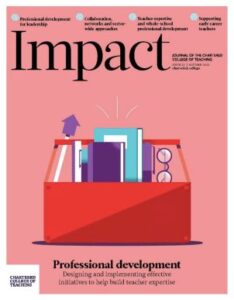Podcast CPD: Putting teachers in control of their CPD

STEVE TAYLOR, CEO, ROBIN HOOD MULTI ACADEMY TRUST, UK
In June 2020, as the UK was beginning to emerge from the first COVID-19 lockdown, schools were naturally planning ahead for what we thought would be a fresh start in September. At Robin Hood Multi Academy Trust (a small group of four primary schools in Birmingham), we began to think about professional development opportunities for staff. We couldn’t envisage the level of disruption that has occurred this academic year, yet we did hypothesise that staff development for the school year 2020–21 would largely be based around COVID-19 safety and the upskilling of staff for online learning.
With professional development for staff across the country focusing inwardly on systems and procedures for dealing with the pandemic, we realised that education could be about to enter a phase where, at a time when networking and the sharing of practice were needed most, schools might focus on becoming operational at the expense of other aspects of development.
Research underpinning the concept
With this in mind, we began to research how we might develop a form of professional development that could bring staff together at a national level. We decided to focus on community, innovation and altruism as the three central tenets. We looked at the work of Pink (2009), in which he places an emphasis on the channelling of intrinsic rewards and increased levels of autonomy in developing long-term sustainability in organisations, which he terms ‘motivation 3.0’. We then explored research around organisational citizenship behaviour (OCB) and came across the work of Xerri and Brunetto (2013), which focuses on developing a sense of belonging and collaboration through reciprocity, and this ultimately led us to the concept of ‘team altruism’ explored by Li et al. (2014).
We established a number of key principles that we wanted our new professional development concept to adhere to:
- It should be free and open to anyone working in education, regardless of status or role
- A focus should be placed on the development of the whole person as much as the development of the professional
- The CPD should be self-directed and should be aimed at teachers who are motivated to improve themselves
- Flexibility, adaptability and ease of access are key – this is based around the premise that teachers are under more pressure in the pandemic than ever before, and so any CPD needs to be able to be accessed at a time that suits the staff member
- Networking opportunities need to be built into the programme to allow for learning to be shared and a sense of community to be developed
- Initially virtual networks would be created, which hopefully, once the pandemic was over, would allow people to meet in person and develop additional support networks.
Formation of the concept
Based on the above principles, we came up with the concept of delivering a 10-week CPD programme centred on the use of podcasts as tools for self-development. After a period of planning, we concluded that there was a place for a CPD programme that not only curated a list of existing podcasts, but which also introduced a new podcast called #Share-ED Podcast CPD.
We decided to introduce seven podcast episodes – each with a specific focus – across a 10-week programme, interspersed with Zoom meetings that allowed participants to share what they had learned, listen to what others had learned and network via breakout rooms. The Zoom meetings provided a platform for networking during the pandemic, and ensured that Podcast CPD encouraged active, rather than passive learning.
We chose to focus on the following four key developmental areas, which were chosen so that there was a balance between professional improvement and personal growth:
Vision: To make a difference in an area of expertise, you have to have a clear vision and be able to visualise what you want to become or create.
Reflection: Being able to reflect with as much objectivity as we can about our own performance and learning is central to growth.
Self-regulation: The ability to regulate how you respond to certain circumstances is a key attribute to leading a happy and fulfilling life, both professionally and personally. Self-regulation is critical when operating under pressure.
Self-improvement: The drive for self-improvement is the foundation for growth and the starting point for all personal and professional development.
The launch of Podcast CPD
Following the development of the four key areas, we were able to refine and build Podcast CPD Cohort 1 and launch it nationally in January 2021 as free, widely available CPD.
In March 2021, we concluded Cohort 1. In total, we had 460 people from across not only the UK but also countries such as Spain, Panama and Italy take part in the programme, with the average attendance at each of our live Zoom events being 140 participants and over 7,000 downloads since January 2021 of #Share-ED Podcast CPD.
What was learnt
Our evaluation of the first round of Podcast CPD has highlighted a range of real positives:
- Educators across the country appreciated the fact that the CPD was free, could be done in their own time and focused on personal development
- Participants have formed networks and connections as a result of the CPD
- Ninety-two per cent of participants who attended the live Zoom sessions rated them as at least ‘good’, with 83 per cent rating them as ‘very good’ or ‘excellent’
- Feedback from participants was positive about networking in the breakout rooms
- The concept fills a gap in the CPD landscape currently.
While these positives mean that we are due to launch an improved version for Cohort 2 in late September 2021, there were also a number of key lessons to be learned:
- Some schools had allocated Podcast CPD as ‘dedicated hours’ to pay back an additional inset day in December 2020 that the DfEDepartment for Education - a ministerial department responsible for children’s services and education in England granted to schools as a result of the pandemic. This invariably meant that some staff attended the CPD without the drive to be there.
- The CPD was primarily built for staff in our Trust and was always pitched as a voluntary layer of professional development for those who wanted to engage with additional learning and development. Out of the 460 participants globally, only 30 came from within our organisation. This might be due to the fact that our staff had already received a lot of internal training, and so the programme was viewed as something additional rather than innovative. Whereas participants external to the Trust viewed the programme as an opportunity. This is something that we plan to reflect on further.
- Communicating with nearly 500 participants on a weekly basis proved tricky, and we’ve since decided that less frequent, higher-quality communication is better.
In conclusion
In summary, we were able to take an exciting concept and roll it out nationally for free to anyone working in education. While we are proud of the concept, we see it as a first step in a long and exciting journey. The pandemic has shown that, more than ever, educators need to unite; we need to look with increasing ambition at what can be achieved if only we collaborate further as a group of professionals.
More information can be found at: robinhoodmat.co.uk/podcast-CPD.
References
Li N, Kirkman BL and Porter COLH (2014) Toward a model of work team altruism. Academy of Management Review 39(4): 541–565.
Pink DH (2009) Drive: The Surprising Truth About What Motivates Us. London: Penguin Books Ltd.
Xerri MJ and Brunetto Y (2013) Fostering innovative behaviour: The importance of employee commitment and organisational citizenship behaviour. The International Journal of Human Resource Management 24(16): 3163–3177.










